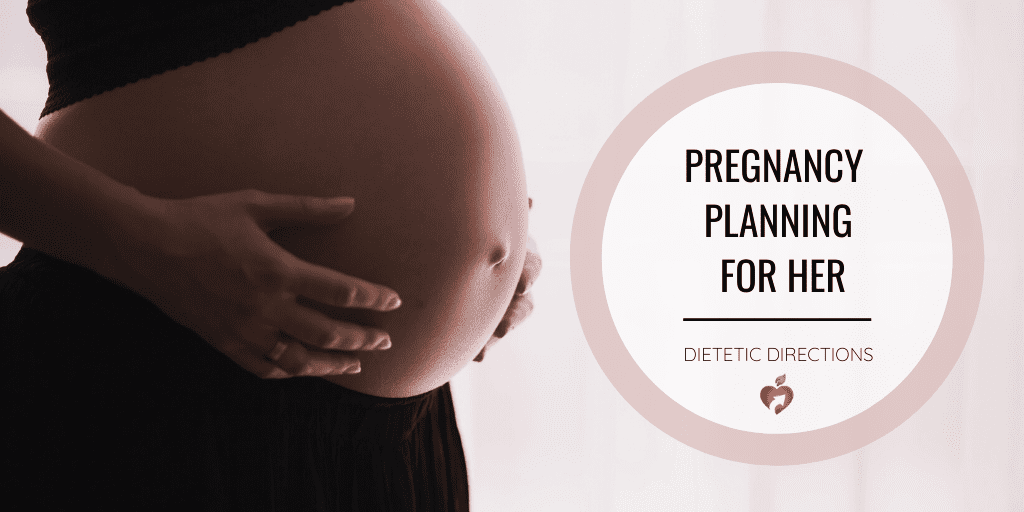
Pregnancy Planning for Her
Many women planning on becoming pregnant want to ensure they are meeting their nutritional needs to provide the best possible health outcomes for their unborn child. Poor dietary quality, chronic dieting, unhealthy lifestyle behaviours (such as sedentary lifestyle, stress, alcohol, smoking) and a diet lacking key nutrients, all compromise the health of an unborn child. Today’s article will highlight my top 5 dietary considerations for women planning on becoming pregnant. I will also address dad’s diet in part two of this series since he plays a vital role as well.
Top 5 Dietary Considerations for Her:
1. Achieve a Healthy Body Weight
Healthy body weight is one of the most important factors affecting fertility (impacts ovulation, hormones and pregnancy rates).
Healthy body weight is one of the most important factors affecting fertility. Click To TweetWHY: If you are underweight or overweight this is associated with negative health outcomes such as increased risk of preterm birth, low/high birth weight baby, increased caesarean delivery, gestational diabetes.
TIPS: Incorporate healthy, sustainable strategies to achieve a desirable weight through diet and lifestyle. If aiming for weight loss, avoid crash diets, which compromise nutrients in your body. You can also work one-on-one with a dietitian for assistance in reaching a healthy weight.
2. Folic Acid
Health Canada states that all women who could become pregnant and those who are pregnant should take a daily multivitamin containing 0.4 mg (400mcg) of folic acid.
Women who could become or are pregnant should take a daily multivit containing 0.4 mg of folate. Click To TweetWHY: Folic acid is important before conception (and during pregnancy) because it reduces the risk of neural tube defects and spina bifida. Folic acid also makes healthy blood cells for mom, which is very important during pregnancy.
TIPS: Ensure you are receiving folic acid in supplement and include foods rich in folates in your diet such as leafy veggies, fruit, beans and fortified grains. Also, it is a good idea to ensure that your multivitamin supplement also contains vitamin B12.
3. Iron
Health Canada states that all women who could become pregnant (and those who are pregnant) should ensure their multivitamin contains 16-20 mg of iron.

WHY: Iron is the most common type of nutritional deficiency and there is an increase in demand during pregnancy due to expanding blood volume. Therefore, it is a good idea to ensure that iron stores are built up before becoming pregnant.
TIP: Ask your doctor to check your iron levels before becoming pregnant and speak to a registered dietitian if needing to increase dietary iron or if you require a supplement.
4. Fish & Omega 3’s
Women planning on becoming pregnant should be encouraged to consume foods rich in omega 3 fatty acids found in fatty fish such as salmon, herring, mackerel, and sardines. Instead of avoiding fish when planning on becoming pregnant, Health Canada states, “the benefits of eating fish are greater than not eating fish, when pregnant women choose the recommended types and amounts.” Therefore, women do not need to limit consumption of fish in general, but they should limit amounts of fish high in mercury.

Try this Maple Dijon Salmon recipe for extra omega 3’s!
WHY: Research supports the positive association between fish consumption and increased gestational length as well as brain development (Haugen et al, 2008). However, high levels of mercury exposure in utero when the baby’s brain is still developing can lead to irreversible neurological problems.
TIPS: Consume fish low in mercury such as: salmon, trout, herring, haddock, canned light tuna, pollock (Boston bluefish), sole, flounder, anchovy, char, hake, mullet, smelt, Atlantic mackerel, shrimp, clam, mussel and oysters.
- Health Canada recommends that women who may become pregnant limit consumption of high mercury fish such as: shark, swordfish, marlin, orange roughy and escolar to 150 grams (5 ounces) per month. One serving of fish is equivalent to 2.5 ounces.
- Limit Albacore (“white”) canned tuna since it has more mercury than canned light tuna. Health Canada recommends that women who may become pregnant (or who are pregnant) consume a maximum of 300 grams of canned albacore tuna per week.
- Aim to consume 2-3 servings of cooked (low-mercury fish) each week for a complete protein source and brain-power boosting omega 3’s for baby and mom.
Vitamin D
The “sunshine vitamin” gets a lot of attention and is also a crucial in the diets of women wanting to become pregnant.

WHY: Vitamin D is needed to maintain proper levels of calcium and phosphorous which help build bones and teeth for baby. A vitamin D deficiency during pregnancy can cause growth retardation and skeletal deformities (such as rickets). It may also have a negative impact on birth weight. Researchers believe that a vitamin D deficiency during pregnancy can affect immune function from birth through adulthood.
TIPS: Women who are pregnant, lactating or planning on becoming pregnant are advised to take a vitamin D supplement 600IU (15 mcg) once daily as recommended by Health Canada.
Bottom Line:
Healthy eating is crucial for a healthy body and a healthy baby. Mothers-to-be should be mindful of leading a healthy lifestyle and ensuring their diets meet all nutritional requirements when planning on having a little one!



